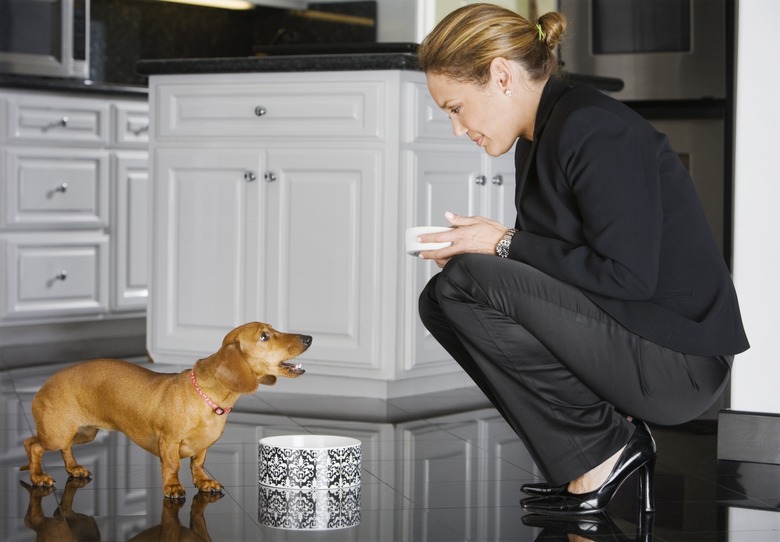How Do I Help My Skinny Dog Gain Weight?
If your dog receives an adequate, nutritious diet but remains thin, you might have to go through some trial-and-error feeding to help the skinny dog gain weight. Make sure you're feeding a high-quality dog food that contains all the nutrients your dog needs for his lifestyle. Also consider your dog's breeding and lifestyle: An active dog needs more calories than a couch potato.
Visit the Vet
Visit the Vet
If your dog receives ample amounts of food but isn't gaining weight, take him to the vet for a thorough checkup to make sure no underlying illness or condition is causing lack of weight gain. Common causes of canine weight loss include intestinal parasites, dental issues, infections and inflammation. Your vet will conduct tests to ensure your dog isn't suffering from diabetes, hyperthyroidism, cancer, inflammatory bowel disease or other serious illnesses that could cause weight loss. If your dog is otherwise healthy, a change of diet or additions to his current food can help him gain weight.
Changing Dog Foods
Changing Dog Foods
Does your dog scarf down his meals, or does he eat slowly or even leave food behind? It's possible that he doesn't care for his food, even if it's an expensive, well-balanced, commercial diet. Consider changing brands or flavors and see if he happily cleans his plate. If you primarily feed kibble, consider adding canned food to the diet. Make dietary changes over the course of several days to avoid gastrointestinal upsets. Go ahead and involve your vet in your dietary planning; you'll want the vet involved throughout.
Preparation Tips
Preparation Tips
If your dog is a picky eater, try warming his food in the microwave before serving. You just need to warm it in there for a short time, perhaps 20 seconds. Touch the food before giving it to your dog to ensure it's not too hot. You might also want to add warm chicken or beef broth to make his meals more tasty, or put some commercial "pet-gravy" in his food.
Feeding Extras
Feeding Extras
Adding carbohydrates to your dog's regular food can aid in weight gain. Make up a batch of rice or pasta a couple of times a week, and spoon a few tablespoons into your pet's meal. Ask your vet about adding canine weight-gain supplements or fats to his meals. If your dog is skinny but healthy and doesn't care to eat, ask your veterinarian about prescribing appetite stimulants.
Feeding Emaciated Dogs
Feeding Emaciated Dogs
If you rescue a truly emaciated dog, rather than one who's just underweight, there's a different feeding protocol altogether. You can't just give a starved dog as much as he wants to eat — that can kill him. "Refeeding syndrome" in starved animals occurs when body cells are overloaded with phosphorus and potassium, resulting in potentially fatal cardiac and respiratory irregularities. Your vet will advise you on the right type of food for the dog — often high-calorie puppy food — and will likely recommend feeding small portions four to six times daily.
Always check with your veterinarian before changing your pet's diet, medication, or physical activity routines. This information is not a substitute for a vet's opinion.
